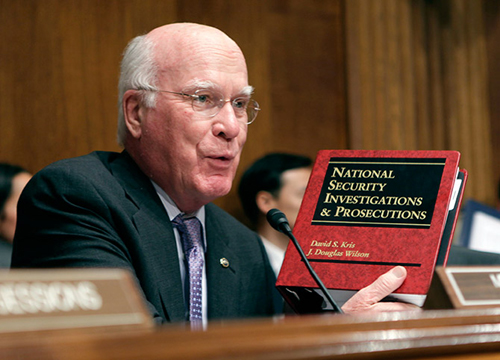Powerful Senate leaders on Thursday bowed to FBI concerns that adding
privacy protections to an expiring provision of the Patriot Act could
jeopardize “ongoing” terror investigations.
 |
| In an about-face, Sen. Patrick Leahy removed privacy protections in a key Patriot Act provision up for renewal before the Senate Judiciary Committee, which the Democrat of Vermont chairs.(AP) |
|
The Patriot Act was adopted six weeks after the 2001 terror attacks,
and greatly expanded the government’s power to intrude into the private
lives of Americans in the course of anti-terror and criminal
investigations. Three provisions are expiring at year’s end.
During a Senate Judiciary Committee hearing, Sen. Patrick Leahy, the
committee chairman, and Sen. Dianne Feinstein
(D-California) introduced last-minute changes (.pdf) that would strip away some of the privacy protections Leahy had espoused just the week before. The Vermont Democrat said his own, original proposal of last week could jeopardize ongoing terror investigations.
“All of us are mindful that threats against American safety are real
and continuing,” Leahy said at the hearing . “I’m trying to introduce
balances on both sides.”
He was discussing one of the most controversial provisions of the Patriot Act — Section 215.
That allows a secret court — known as the Foreign Intelligence
Surveillance Act Court or FISA court — to authorize broad warrants for
most any type of records, including those held by banks, libraries and
doctors.
The Leahy-Feinstein amendment, which is likely to be adopted by the
committee and sent to the full Senate next week, does not require the
government show a connection between the items sought under a Section
215 warrant and a suspected terrorist or spy.
Just last week, however, Leahy touted an amendment that required a
connection to terrorism. Under the Leahy-Feinstein amendment, the
standard would allow secret-court warrants to be issued if the
information sought pertains to an “authorized investigation.” That’s
roughly the same language already in the Patriot Act.
 |
| Sen. Dianne Feinstein sides with FBI on Patriot Act.(AP) |
|
Feinstein, also chairwoman of the Senate Select Committee on
Intelligence which often is briefed on key classified activities, said
the last-minute change was needed to keep America safe.
“The biggest investigation since 9/11 is ongoing,” Feinstein
said. ”My concern was that nothing we do here interfere with an
investigation that is going on.”
Two weeks ago, the authorities said they cracked an al-Qaida cell that was planning a terror attack
in the United States. At least three were arrested, including an
airport shuttle driver who the authorities said had handwritten notes
on how to build bombs.
Democratic senators Benjamin Cardin (Maryland), Sheldon Whitehouse
(Rhode Island) and Edward Kaufman (Delaware), also had their names
attached to Thursday’s Leahy-Feinstein amendment.
Sen. Russ Feingold (D-Wisconsin) was not so sure of the amendment, although the panel unanimously adopted it for consideration.
“We must not continue to kick this can down the road. The rights and
freedoms of Americans are at stake,” he said. The government’s Section
215 power is riddled with “rampant misuse and abuse,” he said, but
would not elaborate because the information was classified.
An amendment (.pdf) by Sen. Richard Durbin (D-Illinois) to repeal the Leahy-Feinstein amendment was swiftly defeated on a 4-15 vote.
“[Section] 215 orders without any connection to a suspected
terrorist or spy, this could lead obviously to a government fishing
expedition,” Durbin argued.
Sen. Jeff Sessions (R-Alabama) countered that Durbin’s amendment is
unworthy of consideration. “I think it will impact the operation of
what we are doing,” he said.
Feinstein added: “I think Senator Sessions is correct.”
She said the FBI does not support Durbin’s proposal. “It would end several classified and critical investigations,” she said.
A saving grace to the Leahy-Feinstein amendment is a provision that
library records are subject to a higher standard, that they must be
relevant to a terror investigation to be subject to a Section 215
warrant.
The government reported that as many as 220 warrants under Section
215 had been authorized since 2004. The government has also said
there’s a classified government operation that relies on those orders.
While the bulk of Thursday’s hearing surrounded Section 215, two other expiring provisions received scant attention.
One is the so-called “lone-wolf” measure that allows FISA court
warrants for the electronic monitoring of a person even without showing
that the suspect is an agent of a foreign power or a terrorist. The
government has said it has never invoked that provision, but said it
wants to keep the authority to do so.
The other expiring measure is the so-called “roving wiretap”
provision. It allows the FBI to obtain wiretaps without identifying the
target or what method of communication is to be tapped. The FISA court
grants about 22 such warrants annually.
“It has been suggested that roving wiretaps can be used against
anyone. The roving wiretap authority can only be used after a court
order has been obtained with probable cause that the target is an agent
of a foreign power,” Feinstein said. “There are no known abuses of this
authority.”
The Judiciary Committee is expected to vote on a final package next Thursday.
The Leahy-Feinstein plan also requires publication of audits,
including how many times the government has used the Patriot Act’s
provisions, including the number of targets. Much of the government’s
public reporting on the topic has been voluntary, and very little is
known about how often each power has been used and why.
Feingold, meanwhile, is likely to introduce two more amendments to the package before next week’s vote, he said.
One concerns limiting the government’s power to issue so-called
National Security Letters. The letters allow the FBI, without a court
order, to obtain telecommunication, financial and credit records
relevant to a government investigation. The FBI issues about 50,000 of
them annually and an internal watchdog has repeatedly found abuses of
the powers. The new standard would authorize those records if the
investigation concerned terrorism or spy activities.
A 2007 Inspector General Report showed that the FBI circumvented that law to acquire access to records that weren’t relevant to any authorized FBI investigation.
The other Feingold amendment focuses on withdrawal of telecom
immunity legislation. That legislation, signed by President George W.
Bush and backed by then Sen. Barack Obama, killed federal lawsuits
claiming the telcos illegally assisted the Bush administration in
funneling Americans’ electronic communications to the National Security
Agency without warrants.
The American Civil Liberties Union said Leahy and Feinstein had offered a “watered-down” version.
“The bill, as it stands now, falls far short of including civil
liberties protections shown to be necessary by the results of oversight
and audits of the Patriot Act that have been made public to date,” said
Michael Macleod-Ball, the acting director of the ACLU’s legislative
office in Washington.
The Electronic Frontier Foundation brought the telco litigation. Here is the take on Thursday’s developments by Kevin Bankston, an EFF privacy attorney.
Wired

